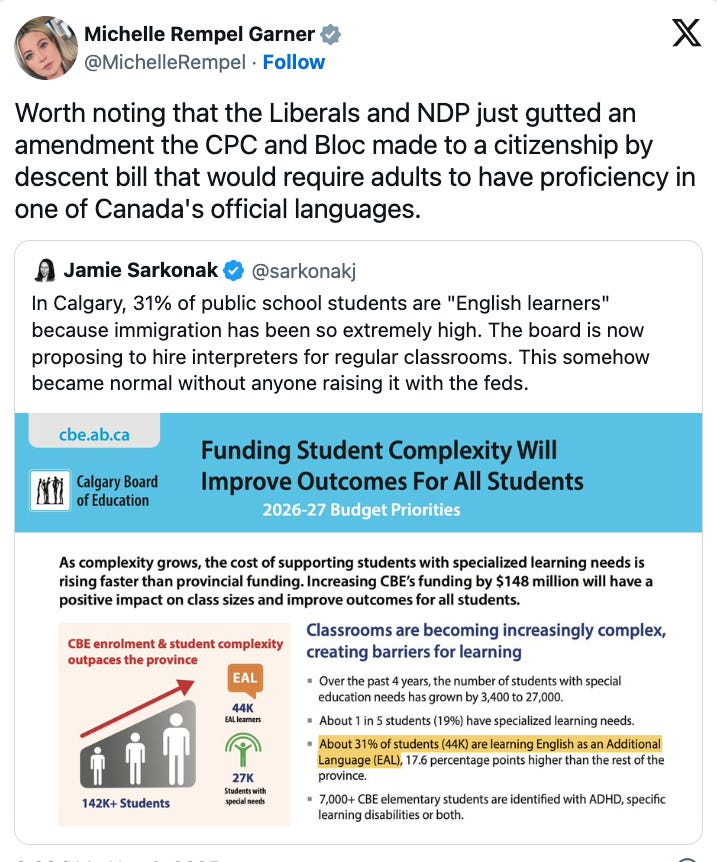“Chain migration” bill advances after Liberals, NDP reject citizenship language requirements
A controversial bill dubbed the “chain migration” bill by Conservatives is moving forward after the Liberals and NDP rejected amendments that would have required stricter security checks.
A controversial bill dubbed the “chain migration” bill by Conservatives is moving forward after the Liberals and NDP rejected amendments that would have required stricter security checks, language tests, and stronger ties to Canada for new citizens. The bill, known as Bill C-3, is now headed for its third reading.
Bill C-3, “An Act to amend the Citizenship Act,” passed with 169 in favour to 163 against in the House of Commons on Monday after the NDP voted to reverse the amendments made by the Bloc Québécois and Conservatives during a committee. The NDP had no say at the committee level, as they do not hold official party status.
The bill, which is expected to pass in the House of Commons in its third reading and be voted on in the Canadian Senate, would automatically grant citizenship to individuals born abroad who were descendants of immigrants who later became citizens.
Without the bill, there is a “first-generation limit,” meaning those born in another country are only automatically citizens if one parent was born in Canada.
In December of last year, the Parliamentary Budget Officer estimated that a previous iteration of the bill would grant citizenship to approximately 115,000 people over five years, at a cost to taxpayers of $20.8 million during the same period.
During immigration committee meetings, the Bloc and Conservatives would have required these new automatic citizens to demonstrate proficiency in English or French, possess a basic knowledge of Canadian history, pass security checks, and extend the length of time the parent of the new citizens had to be in Canada from three years to five.
NDP MP Jenny Kwan introduced an amendment reversing the joint amendments from the Conservatives, before the bill passed, and similarly passed on the House floor.
Conservative MP Michael Ma lamented that a party without official party status and that didn’t participate in the committees was able to reverse “months of work” done at the committee with the Liberal government. He said the committee’s work was being “undone” by the “post-nationalist” NDP and Liberals.
“They believe in a two-tier immigration system where citizenship by naturalization within our borders has harder requirements than Citizenship by Descent outside of our borders. They believe in distributing the privileges of Canadian citizenship abroad while offloading the cost and duties of citizenship to those who live coast to coast to coast,” Ma said. “They believe that Canadians of convenience should be able to wear the Team Canada Jersey without even putting time on our ice.”
Ma said during a debate in the House of Commons that it was “not a high bar” to demand proficiency in an official language, that new Canadians should understand the privileges and responsibilities of being Canadian, or to have basic security assessments before letting them into the country.
Liberal and NDP supporters of the bill argue that the new citizens are “lost Canadians,” and that other Canadian citizens are not subjected to security, language proficiency, and citizenship tests; therefore, neither should the latest additions to Canada.
This comes after the Calgary school board asked for $148 million, in part, to support the nearly one-third of its students who need assistance “learning English as an additional language.” The Calgary Board of Education asked its provincial government to help fund “interpreters” to be in every regular classroom, as eight out of an average 28-student class lack proficiency in English.








The Calgary school board wants 150 million dollars extra because they claim a third of their students need help in learning the english language. Plus we have over 850 foreigners in our jails costing $150,000 a year each.
They don't want to speak to us anyway